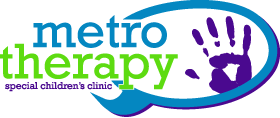Spring 2017 Newsletter
What do Speech-Language Pathologists do at Metro Therapy?
We focus on helping children of all ages develop essential communication skills. These include developing pre-linguistic skills, understanding and formulating language, producing correct speech sounds, improving speech intelligibility, using alternative and augmentative communication (AAC), developing more fluent speech, improving vocal quality and healthy voice habits, understanding and following social rules, and improving executive functions such as planning, organizing, attention, and problem solving.
What is the difference between speech and language?
Many people think of these two terms interchangeably. However, speech refers to the physical process of coordinating breathing, voicing, and movement of the lips, tongue, and jaw to produce speech sounds. Language is the rule governed symbolic system of conveying information. Sign language and writing are examples of using language without speech. Speech-language pathologists can help improve skills in both speech and language.
What is Occupational Therapy?
Occupational Therapists focus on helping people engage in meaningful and purposeful activities. We look at how a person’s abilities match the activities they want or need to do, including daily living, education, work, play, and social participation. We use purposeful activities to increase performance and participation in everyday life activities. (Occupational Therapy Practice Framework, 2002)
What do occupational therapists do at Metro Therapy?
We work with infants, children, and adolescents with special needs. After an assessment of the child’s abilities in areas such as neuro-sensory processing, motor skills, psycho-social skills, self-care abilities, play skills, and/or oral motor/feeding abilities, we provide individualized treatment using therapeutic techniques appropriate for each child and consultation to parents.
What is Sensory Integration Therapy?
Sensory integration therapy uses specifically chosen childhood activities (such as swinging, jumping, coloring, and dressing) to improve how the brain processes, organizes, and responds to sensory information. These activities are designed to help your child take in sensory information (such as how they are moving, what they are touching, what they hear and see), integrate the information, and response in an adaptive or appropriate way.
Why does therapy using sensory integration work?
Brains (especially young brains) are flexible and capable of neural changes. As the brain matures some flexibility is lost. If the child is young enough to grow new connections among his neurons (under age 2), then therapy might help him do so. If the child is older, therapy appears therapy facilitate the transmission of messages from one neuron to another so that these messages flow with greater ease and efficiency.
Better Hearing and Speech Month
The month of May is Better Hearing and Speech Month. This year’s theme is “Communication: The Key to Connection”. Be on the lookout for special information, handouts, and activities all month long!
Autism Awareness
April 2 is World Autism Awareness Day. Please join us in wearing blue the first week of April. The Autistic Self Advocacy Network (ASAN) also promotes Autism Acceptance Month during the month of April. Visit www.autismacceptancemonth.com to learn more
Occupational Therapy Awareness Month
OT awareness month is April. This year we celebrate 100 years of occupational therapy! Our theme is “Living Life to its Fullest” stay connected with Metro Therapy throughout the month for fun activities and ways to help us celebrate this exciting time in our profession.
Continuing Ed:
Our speech-language pathologists Brittany and Sarah recently completed a course called Serving Clients from Diverse Backgrounds: Speech Language Difference vs. Disorder.
Sarah also completed the courses Recognizing and Treating Toddlers and Preschoolers with Red Flags for Autism and Speech Sound Disorders in Special Populations.
Our occupational therapy department (Veronica, Jessica, Kelsey, Katy, Becka and Sarah B) completed online course titled ‘Essentials of Sensory Integration Theory, Part One: Modulation and Somatosensory Processing’ and ‘Essentials of Sensory Integration Theory, Part Two: Visual Vestibular, and Auditory Sensory Processing; Cerebellar and Praxis Functioning’
Kelsey completed “Treating Sensory Modulation Disorders: The S.T.E.P.S.I A Tool for Effective Clinical Reasoning” a two day course.
Katy completed “Function from the Inside Out: Sensory and Motor Processing for Postural Control” a 2 day course and ‘Filling Your Toolbox with Techniques: Treating Children With ADHD’
Becka completed the courses ‘Sensory Profile 2: What's New And What Stayed The Same?’, ‘Early Intervention, A Fine Motor Review’ and ‘Exploring The Efficacy Of Weighted Blankets With Children With Autism Spectrum Disorders (ASD) And Sleep Disturbances’
This spring Veronica Clark has been teaching Theory of Pediatric Occupation lecture and lab courses for Herzing University. She is thrilled to be passing on her passion for working with kids to the next cohort of students.
Clinic Closures
Metro Therapy will be closed May 29th for Memorial Day.
